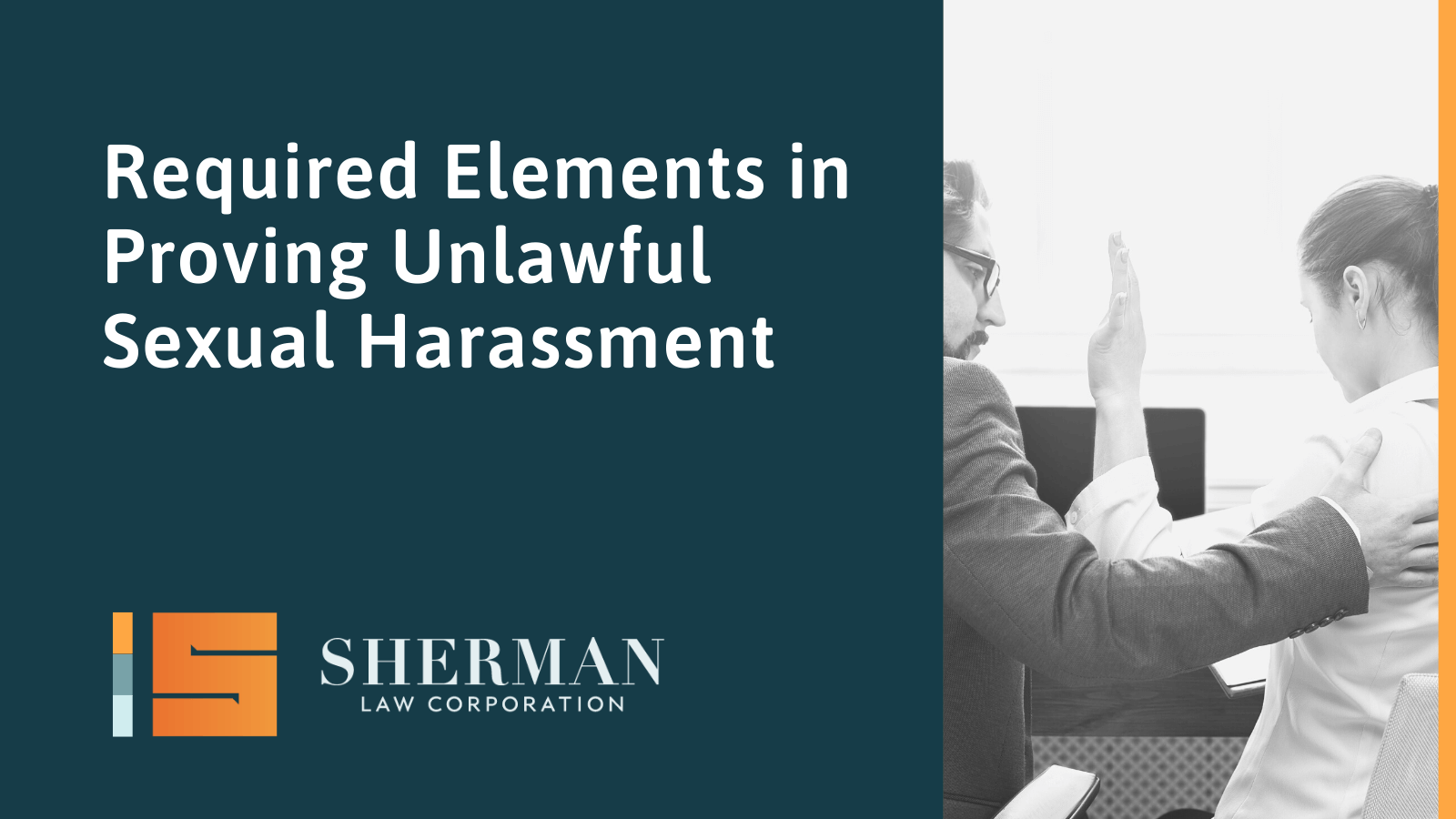
Employers throughout the U.S. receive all kinds of complaints, claims, and accusations. And claims regarding retaliation are the most frequently alleged in the federal sector.
But A California Employee Needs These Three Elements When Proving Unlawful Retaliation Claims:
- First: The employee engaged in protected activity;
- Second: The employer took an adverse employment action against the employee;
- Third: A causal link between the protected activity and the adverse employment action. (In other words, the employer took against the employee because of the protected activity.)
So let’s take a look at what these elements mean for employers, and how you can fight a retaliation claim or avoid them altogether with the help of the Sherman Law Firm.
First, what is an unlawful retaliation claim?
Let’s say that an employee complains to their supervisor about experiencing discrimination in the office. The next day, that same employee received a demotion. If the employee can prove that the supervisor demoted the employee because of their complaint, that would be an example of retaliation.
However, only changes that have an adverse effect on employment are retaliatory.
So, for example, if your employee lodges a complaint and you begin to act more professional around them (and less friendly), this cannot count as a retaliation claim.
But if you moved their shift or their desk with the intention of removing them from a bad situation and it instead creates more problems for the employee, the situation becomes more complicated.
What are protected activities?
Employees have the right to be free from discrimination and harrassment in the workplace. When they assert these rights, called protected activities, they should not be punished for it.
The U.S. Equal Employment Opportunity Commission has specific laws prohibiting the punishment of employees (or job applicants) who assert these rights. The EEOC says:
“Participating in a complaint process is protected from retaliation under all circumstances. Other acts to oppose discrimination are protected as long as the employee was acting on a reasonable belief that something in the workplace may violate EEOC laws, even if he or she did not use legal terminology to describe it.”
“The same laws that prohibit discrimination based on race, color, sex, religion, national origin, age, disability and genetic information also prohibit retaliation against individuals who oppose unlawful discrimination or participate in an employment discrimination proceeding.”
The EEOC lists protected activities as including:
- filing or being a witness in an EEOC charge, complaint, investigation, or lawsuit
- communicating with a supervisor or manager about employment discrimination, including harassment
- answering questions during an employer investigation of alleged harassment
- refusing to follow orders that would result in discrimination
- resisting sexual advances, or intervening to protect others
- requesting accommodation of a disability or for a religious practice
- asking managers or co-workers about salary information to uncover potentially discriminatory wages.
What are some of the most common examples of retaliation claims?
Just because an employee asserts their right and take part in protected activities does not mean they can never be disciplined or discharged for other reasons. The important thing to remember is that employers cannot discipline or discharge employees because of their protected activities in a retaliatory or discriminatory manner.
So what are some examples of times that a change does count as retaliation?
- When an employer or supervisor is verbally or physically abusive;
- When an employer or supervisor threatens to make, or actually makes, reports to authorities (such as reporting immigration status or contacting the police);
- When an employer or supervisor makes the employee’s work more difficult.
- When an employer or supervisor gives a performance evaluation that is lower than it should be;
- When an employer or supervisor transfers the employee to a less desirable position;
- When an employer or supervisor increases scrutiny; or
- When an employer or supervisor spreads false rumors.
One example the EEOC gives of potential retaliation is punishing an employee for an EEOC complaint by purposefully changing his work schedule to conflict with family responsibilities.
In order for an action to be considered retaliation, the action must be “materially adverse,” deterring the employee from engaging again in protected activities. These retaliatory actions can even take place outside the work environment if the employer or supervisor commits an action that – again – deters the employee from engaging again in protected activities.
However, some smaller disciplinary actions are considered not materially adverse, and therefore not retaliatory.
For example, small, petty actions are often not considered retaliation, including:
- Moving someone from an office to a cubicle
- Taking more time than usual to produce a reimbursement check for small amounts of money
Each case is different, of course, and the most important thing is that an employee is able to legally prove retaliation.
So, how do employees work to prove retaliation claims?
Again, there are three elements employees have to prove:
- First: The employee engaged in protected activity.
- Second: The employer took an adverse employment action against the employee.
- Third: The employer took against the employee because of the protected activity.
When an employee first suspects retaliation, they will typically first meet with a human resources official for more information. If they’re still not satisfied, that’s when they’ll take their case to the EEOC or another fair employment agency.
The most important thing the employee has to prove is the link between their protected activity and the adverse action (according to their argument, reaction) the employer took in response. The employee will gather evidence in the form of documents and historical records and oftentimes work with an attorney to build their case.
What to do if your employee accuses you of retaliation
The first thing employers should remember is that retaliation does not always come from ill will. For example, a supervisor moves an employee to the day shift because they discussed their preference for the day shift in the past, not because they answered questions in an alleged harassment investigation (as is their right).
However, many times employees do believe there is some ill will involved in the employer’s action, which is why they file a claim of retaliation in the first place. And it’s important to take these claims seriously. Even if the claim seems frivolous at first, it could potentially cost your company money in legal fees, as well as challenge your reputation if the claim is found to have merit.
That’s why it’s so important to hire an experienced employment attorney as soon as possible. Your attorney will be able to guide you through each step of the process and ensure that your money is not wasted and your reputation stays intact.
While it’s important not to admit fault right off the bat, some people recommend organizing a meeting between the employee and the supervisor, manager, or employer they’re filing a claim against – in the presence of HR. This meeting gives an opportunity to both sides to express their feelings and paints a clearer picture of the issue at hand.
Important note: Discuss with your attorney as to whether it’s a good idea to take part or organize this type of meeting.
How to prevent future claims of retaliation
With all of this information in mind, how can companies prevent similar issues in the future? One of the biggest steps is hosting training programs for your employees and higher-level managers on discrimination in the workplace, discipline, and workplace conduct.
At Sherman Law Firm, we conduct on-sie training programs specifically targeted to help your company avoid these types of situations. Participants in our programs come away with a better understanding of the workplace and a better sense of community with each other. The programs also help uncover issues that may have grown over time, and they lead to fewer unreported legal claims across the board.
We offer a total of 10 different programs, the following of which are relevant to retaliation claims:
- Introduction of Newly Created/Updated Employee Handbooks, Policies, Procedures, Processes, Agreements, and/or Forms
- HR 101
- Supervisor 101
- Hiring 101
- AB 1825 Unlawful Harassment, Discrimination, Retaliation and Bullying
____________________
Here are some other ways to prevent other employees from making claims of retaliation against you and your company in the future, as well:
- Be sure everyone has access to a valid, up-to-date employee handbook that discusses the topics above.
- Establish a process for intake and handling of employee complaints that everyone knows about and understands. That way, you can keep track of everything in an organized manner.
- Educate yourself on discrimination and harassment laws and have a go-to lawyer for issues that arise.
- Don’t dismiss claims off the bat. It can be hard to believe that discrimination could be happening at your company, but it’s best to take each and every claim seriously.
- Treat everyone involved with respect and compassion. The complainant may feel upset and vulnerable, and the manager or supervisor may feel nervous or unjustly accused. Because you don’t know the whole story, be sure everyone is treated with respect and don’t jump to any conclusions.
- When an employee reports a problem, any remedial action you take should be in regards to the problem, not the person who reported it.
- If unrelated disciplinary action needs to be taken against someone who also happened to report an issue or take part in an investigation, be sure to document all your reasoning and evidence for the disciplinary action. This will help you in case of a future claim.
- Cooperate with agencies involved and take extensive notes of the whole process. Not only will these notes help you during the current investigation and case, but you’ll be able to take note of them moving forward, as well.
How common are these claims, in general?
As mentioned above, many of the claims the EEOC deals with each year are retaliation claims. In 2019, more than half of the claims that came through their office had to do with retaliation for a total of 39,110 claims.
When we look at the high number of these claims, however, it’s important to keep two things in mind:
- Some of these claims are illegitimate
- The claims that are legitimate are stemming from an emotional place on the part of the supervisor/ manager/ employer
The EEOC reports that,
“Research has consistently demonstrated that the desire for retaliation is common upon experiencing an offensive interpersonal encounter, particularly if the encounter threatens one’s self image … The process of retaliation begins with a perceived offense (e.g., initiating a discrimination claim). If those accused sincerely believe that they have done nothing wrong, or if they believe that their offensive behavior was somehow justified, they may begin to ruminate and desire retaliation. In this regard, retaliation is a coping mechanism -a way of alleviating the psychological discomfort associated with perceived injustice.”
In the case of false allegations, however, it is vastly important for the employer to hire a competent legal team to bring the truth to light.
Why hire the Sherman Law Corporation?
Lisa Sherman understands that 52% of all California employers will face employment-related claims. She also knows that many of these claims are illegitimate, and that employers are often left to bear the brunt of these cases.
That’s why each member of the Sherman Law Corporation team learns the details and facts of our clients’ stories intimately, allowing us to communicate with our clients and give them the best representation possible.
We not only make sure to give our clients a full understanding of the case and its various potential outcomes from the get-go, but we also offer a variety of other services to keep employers out of these types of issues to begin with.
Sherman Law offers counseling on workplace issues, help with workplace investigations, training programs (mentioned above), and other workplace policy and process assistance so that employers never have to get to the point of litigation.




